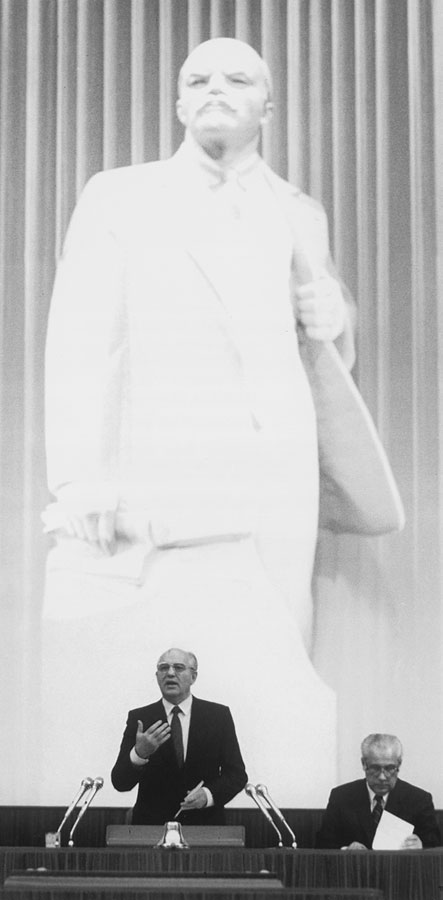Armageddon Averted: The Soviet Collapse, 1970-2000 (2 page)
Read Armageddon Averted: The Soviet Collapse, 1970-2000 Online
Authors: Stephen Kotkin
Tags: #Non-Fiction, #Politics, #History

xv
All translations from Russian sources are the author’s. For transliteration of personal and place names, whether in the text or in discursive endnotes, common usage has been preferred (Yeltsin rather than El’tsin). But for authors’ names and the titles of Russian-language books and articles in the endnotes, the US Library of Congress system has been adopted (Evgenii rather than Yevgeny).
xvi
1
Gorbachev and Ligachev, Prague 1969
2a Leonid Brezhnev
© UPI Photo/Corbis
2b KGB chief Yuri Andropov playing dominoes 3
Brezhnev-era politburo
4
Cover of
Stars and Films
, 1966
Montage by Y Mroshchak
5a KGB delegation in Gdansk 5b Andropov, half dead leader © Rex Features/Sipa Press
6a Chernobyl, 1986
© Igor Gavrilov
6b AvtoVAZ car factory
Robert G. Kaiser, Hannah Jopling Kaiser 7
Gorbachev, 1989
© AP Photos/Boris Yurchenko 8a Pushkin Square demonstrations Stephen Kotkin
8b Ligachev and the media, 1990
9a Soviet High Command
© Leonid Yakutin
9b Gorbachev with Chancellor Helmut Kohl 10
Yeltsin and the crowd
© Sipa Retro/Rex Features
xvii
list of plates
11a Ukrainian Supreme Rada © Chrystyra Lapychak,
Ukrainian Weekly
11b Casualties in Baku, Azerbaijan © Andrey Speransky/Magnum
12a. Elite KGB troops
© Tofik Shakhverdiev
12b August coup plotters
© Novosti (London), © A. Boitsov/Novosti (London), © Associated Press/Topham
13a Anatoly Chubais
13b Woman selling her hair © S. Demianchuk
14a Wide diameter pipes
© Boris Klipintser
14b Norilsk, 1990s
© DJ Paterson
15a T-72 tanks lined up for retreat © Leif Skoogfars/Corbis
15b Central Committee’s city within a city, main entrance © Corbis Sygma
16
Summit meeting of CIS
© Reuters Newmedia Inc./Corbis Whilst every effort has been made to secure permissions, we may have failed in a few cases to trace the copyright holders. We apologize for any apparent negligence.
xviii
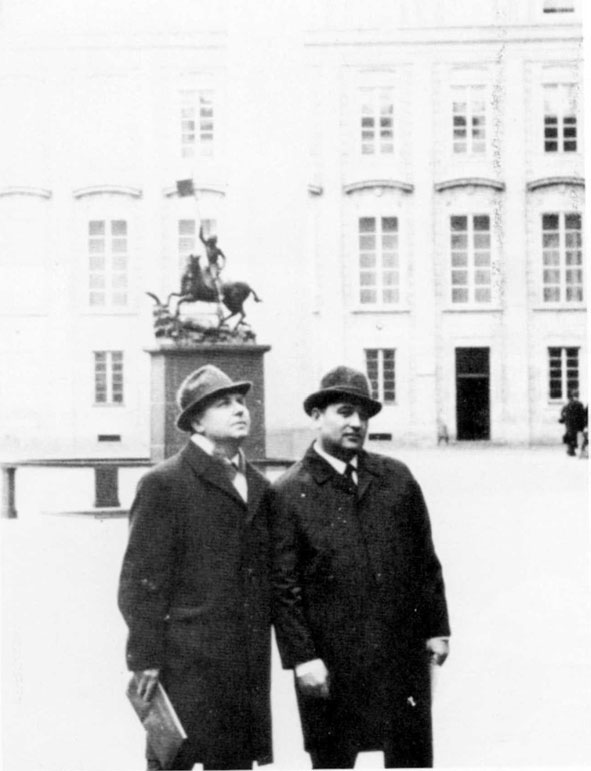
1. Mikhail Gorbachev and Yegor Ligachev, visiting Prague, 1969, one year after the crackdown against the Prague Spring. The two provincial party chieftains learned first hand that the Soviet presence in Eastern Europe was widely opposed as an occupation regime.

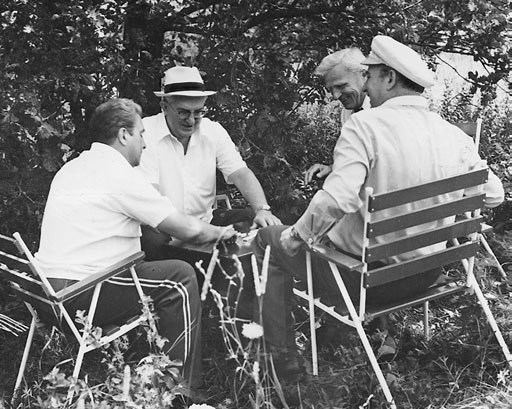
2a. Leonid Brezhnev, bedecked with medals and propped up by his bodyguard, Vadim Medvedev (right), October 1979. The Soviet leader had just delivered a speech in East Germany, whose party boss, Erich Honecker (left), outlived Brezhnev, but was swept away in 1989, right before East Germany disappeared.
2b. KGB chief Yuri Andropov (in white hat), on a rest cure in his native Stavropol province, teaming up in dominoes with the local party host, Mikhail Gorbachev (in worker’s cap), 1970s.
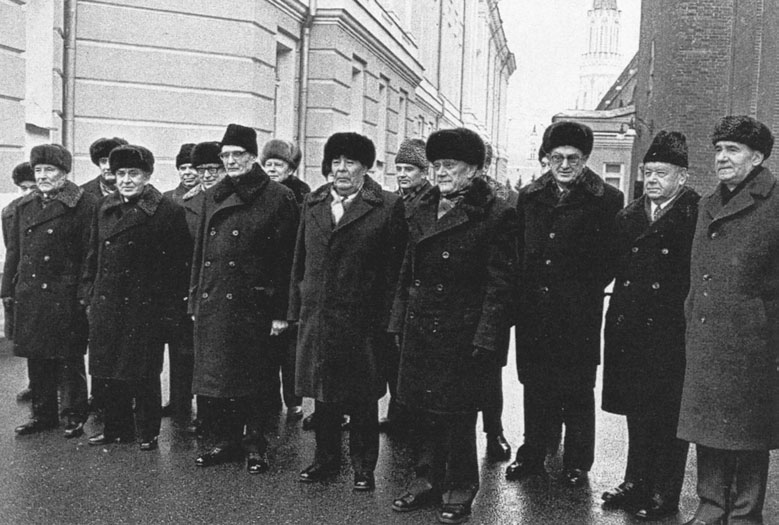
3. Brezhnev-era politburo, November 1980, whose only relative youth was Gorbachev (centre rear). Far right, Andrei Gromyko. Third from right, Yuri Andropov. Fourth from right, Nikolai Tikhonov. Centre, Brezhnev. Third from left, Mikhail Suslov. Second from left, Viktor Grishin. Konstantin Chernenko is obscured.
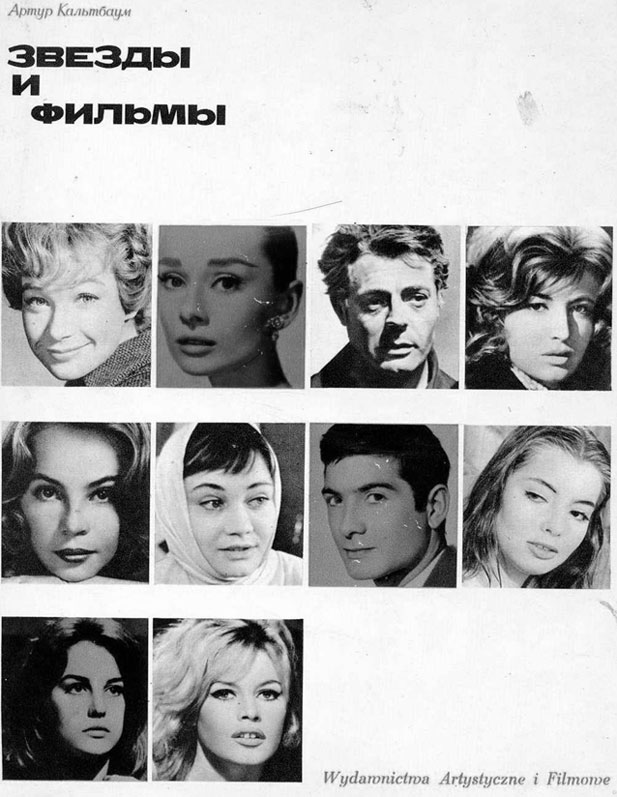
4. Cover of
Stars and Films
, 1966, translated into Russian from Polish. Foreign films and Western mass culture invaded the Soviet bloc. Top row: Shirley MacLaine (US), Audrey Hepburn (US), Marcello Mastroaianni (Italy), Monica Vitti (Italy); middle row: Leslie Caron (France), Larisa Luzhina (Estonia), Jean-Claude Brialy (France), Jacqueline Sassard (France); bottom: Inna Gulaya (Ukraine), Brigitte Bardot (France).
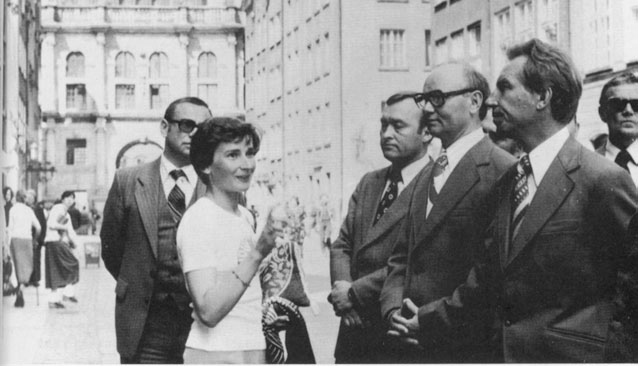
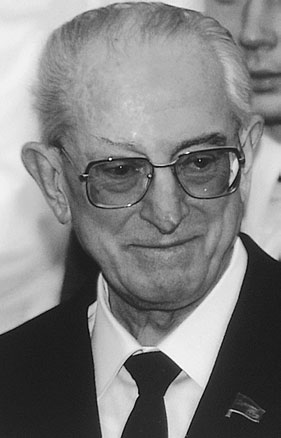
5a. KGB delegation in Gdansk, Poland, 1979, site of mass strikes that led to the formation of Solidarity in 1980. Second from right, head of Soviet esponiage and later KGB chief Vladimir Kryuchkov. Third from right, Oleg Kalugin, who had worked in the Washington station and became the youngest person ever to reach general rank. Far right, Nikolai Leonov, who rose to become chief analyst.
5b. General Secretary Andropov, half dead upon taking over for Brezhnev, 1983.
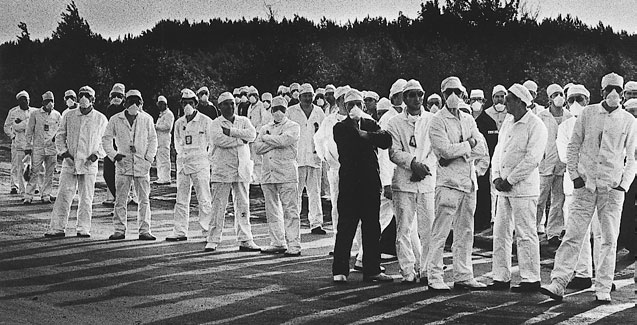
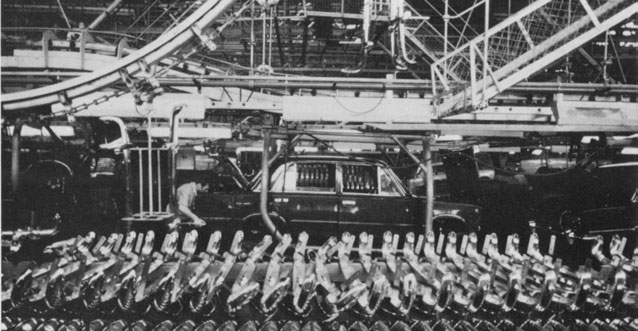
6a. Chernobyl, 1986. The exploded reactor, history’s worst nuclear accident, radiated millions of people, including flimsily clad emergency crews, but helped transform the slogan of glasnost (openness) into a reality. Russia and other post-Soviet states continue to operate reactors identical in design to the one at Chernobyl.
6b. The AvtoVAZ car factory purchased from Fiat in the 1960s, and more modern than the bulk of Soviet manufacturing. AvtoVAZ made more cars than any other factory in the world, but required thirty times more man-hours to produce a car than did a US or Japanese factory, to say nothing of quality. In the late 1980s and throughout the 1990s, AvtoVAZ was looted by management.
